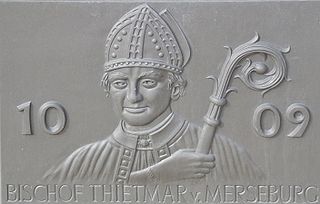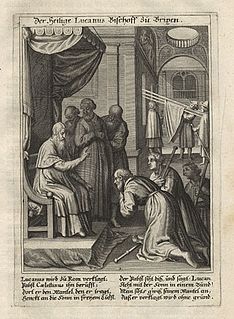
The Prince-Bishopric of Brandenburg was an ecclesiastical principality of the Holy Roman Empire from the 12th century until it was secularized during the second half of the 16th century. It should not be confused with the larger Diocese of Brandenburg established by King Otto I of Germany in 948, in the territory of the Marca Geronis east of the Elbe river. The diocese, over which the prince-bishop exercised only spiritual authority, was a suffragan diocese of the Archdiocese of Magdeburg, its seat was Brandenburg an der Havel.
Bolesław the Brave, less often known as Bolesław the Great, was Duke of Poland from 992 to 1025, and the first King of Poland in 1025. He was also Duke of Bohemia between 1002 and 1003 as Boleslaus IV.

Pope Cornelius was the bishop of Rome from 6 or 13 March 251 to his martyrdom in June 253. He was pope during and following a period of persecution of the church and a schism occurred over how repentant church members who had practiced pagan sacrifices to protect themselves could be readmitted to the church. Cornelius agreed with Cyprian of Carthage that those who had lapsed could be restored to communion after varying forms of penance. That position was in contrast to the Novationists, who held that those who failed to maintain their confession of faith under persecution would not be received again into communion with the church. That resulted in a schism in the Church of Rome that spread as each side sought to gather support. Cornelius held a synod that confirmed his election and excommunicated Novatian, but the controversy regarding lapsed members continued for years.

Maundy, or the Washing of the Feet, or Pedelavium, is a religious rite observed by various Christian denominations. The name is taken from the first few Latin words sung at the ceremony of the washing of the feet, "Mandatum novum do vobis ut diligatis invicem sicut dilexi vos", and from the Latin form of the commandment of Christ that we should imitate His loving humility in the washing of the feet. The term mandatum (maundy), therefore, was applied to the rite of foot-washing on this day of the Christian Holy Week called Maundy Thursday.

Maximin was the sixth bishop of Trier, according to the list provided by the diocese's website, taking his seat in 341/342. Maximin was an opponent of Arianism, and was supported by the courts of Constantine II and Constans, who harboured as an honored guest Athanasius twice during his exile from Alexandria, in 336–37, before he was bishop, and again in 343. In the Arian controversy he had begun in the party of Paul I of Constantinople; however, he took part in the synod of Sardica convoked by Pope Julius I, and when four Arian bishops consequently came from Antioch to Trier with the purpose of winning Emperor Constans to their side, Maximinus refused to receive them and induced the emperor to reject their proposals.
The Peace of Bautzen was a treaty concluded on 30 January 1018, between the Ottonian Holy Roman Emperor Henry II and the Piast duke of the Polans Bolesław I Chrobry which ended a series of Polish-German wars over the control of Lusatia and Upper Lusatia as well as Bohemia, Moravia and Slovakia.

Thietmar, Prince-Bishop of Merseburg from 1009 until his death, was an important chronicler recording the reigns of German kings and Holy Roman Emperors of the Ottonian (Saxon) dynasty. Two of Thietmar's great-grandfathers, both referred to as Liuthar, were the Saxon nobles Lothar II, Count of Stade, and Lothar I, Count of Walbeck. They were both killed fighting the Slavs at the Battle of Lenzen.
Dětmar, Thietmar or Dietmar was the first Bishop of Prague. He came from Saxony and learned to speak Czech. The diocese of Prague was assigned to the archbishopric of Mainz, when Thietmar was elected as the first bishop in 973 at the time of government by Boleslaus II of Bohemia. The creation of the diocese gave Bohemia religious independence from the Empire. Thietmar was known to be a wise and pious man, who ordered the building of many churches and the first cathedral. He died in 982. Adalbert of Prague was elected as his successor.
The von Plötzke, or von Plötzkau family is an old-line noble family from Saxony and Masovia.

The Prince-Bishopric of Minden was an ecclesiastical principality of the Holy Roman Empire. It was progressively secularized following the Protestant Reformation when it came under the rule of Protestant rulers, and by the Peace of Westphalia of 1648 given to Brandenburg as the Principality of Minden. It must not be confused with the Roman Catholic diocese of Minden, which was larger, and over which the prince-bishop exercised spiritual authority.

The Prince-Bishopric of Osnabrück) was an ecclesiastical principality of the Holy Roman Empire from 1225 until 1803. It should not be confused with the Diocese of Osnabrück, which was larger and over which the prince-bishop exercised only the spiritual authority of an ordinary bishop. It was named after its capital, Osnabrück.

Saint Urban of Langres was a French saint and bishop. He served as the sixth bishop of Langres from 374 until his death. Saint Leodegaria was his sister.

Eckard I was Margrave of Meissen from 985 until his death. He was the first margrave of the Ekkehardinger family that ruled over Meissen until the extinction of the line in 1046.

Saint Aprunculus of Trier was Bishop of Trier from the death of his predecessor, Fibicius, whether in 511 or 525, and served in that capacity until his own death, which is presumed to have occurred before the appointment of his successor Nicetius.
Thietmar (I), Count and Margrave, was the military tutor of Henry the Fowler while he was the heir and then duke of the Duchy of Saxony. He probably kept a small body of elite retainers armed with the latest in military technology and well-supplied with expensive horses. His armored cavalry played a decisive role in winning the Battle of Lenzen on 4 September 929, securing German domination along the Elbe river against West Slavic peoples.

The Lutici or Liutizi were a federation of West Slavic Polabian tribes, who between the 10th and 12th centuries lived in what is now northeastern Germany. Four tribes made up the core of the federation: the Redarians, Circipanians (Circipani), Kessinians and Tollensians (Tholenzi). At least in part, the Lutici were a continuation of the Veleti. In contrast to the former and the neighboring peoples, the Lutici were not led by a Christian monarch or duke, rather power was asserted through consensus formed in central assemblies of the social elites, and the Lutici worshipped nature and several deities. The political and religious center was Radgosc.

Werner of Oberwesel was a 16-year-old boy whose unexplained death was blamed on Jews, leading to revenge killings of Jews across Europe. He was venerated as a Christian saint, and his memorial day was 19 April.

Saint Lucanus of Sabiona or Lucanus of Säben, is a Roman Catholic saint of the fifth century, associated with the Dolomites and the Tyrol.
The German royal election of 1002 was the decision on the succession which was held after the death of Emperor Otto III without heirs. It was won by Duke Henry IV of Bavaria among accusations of uncustomary practices.

Fintan of Rheinau(Findan, Findanus) was an Irish Catholic hermit who settled in Rheinau. In the Catholic Church he is venerated as a saint.














